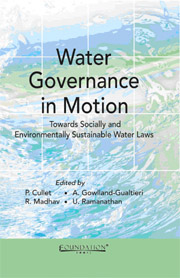Book contents
- Frontmatter
- Contents
- Acknowledgments
- Contributor Biographies
- Introduction
- I Water Law, Policy and Institutional Reforms in India
- 1 Water and Questions of Law: An Overview
- 2 Water Law – Evolving Regulatory Framework
- 3 Discourses in Water and Water Reform in Western India
- 4 The Slow Road to the Private: A Case Study of Neoliberal Water Reforms In Chennai
- II Ongoing Irrigation and Ground Water Reforms in India
- III Perspectives on Privatisation
- IV Environment and Human Rights
- V Comparative Perspectives on Reforms
- Bibliography
4 - The Slow Road to the Private: A Case Study of Neoliberal Water Reforms In Chennai
from I - Water Law, Policy and Institutional Reforms in India
Published online by Cambridge University Press: 26 October 2011
- Frontmatter
- Contents
- Acknowledgments
- Contributor Biographies
- Introduction
- I Water Law, Policy and Institutional Reforms in India
- 1 Water and Questions of Law: An Overview
- 2 Water Law – Evolving Regulatory Framework
- 3 Discourses in Water and Water Reform in Western India
- 4 The Slow Road to the Private: A Case Study of Neoliberal Water Reforms In Chennai
- II Ongoing Irrigation and Ground Water Reforms in India
- III Perspectives on Privatisation
- IV Environment and Human Rights
- V Comparative Perspectives on Reforms
- Bibliography
Summary
Introduction: Anomalies and Contradictions of Reform
A tragic conundrum of the turn of this century is that the changes so long awaited and demanded in our governing systems have appeared in the form of ‘reform’ – a term that serves as a euphemism for the unleashing of neoliberal orthodoxies across the spectrum of sectors and services. The word reform has come to index a politics of complicity between global commercial interests, international aid agencies, and national governments, aimed at transforming public resources into profitable enterprises. In the institutional arena, a reforming agency means one that has come under the financial and managerial disciplines of the commercial sector. The consensus on ‘best practice’ across sectors is one in which state agencies operate like profit-making businesses, firmly turning their backs on transfer-based or relief-oriented welfarism. This new order, then, spells an even greater alienation of public institutions from the public than was witnessed under bureaucratic regimes.
But reform of municipal water systems is tricky business in more ways than one. From a business perspective, these systems have scales of operation, capital intensity and tariff structures which are not easily amenable to commercialisation and/or privatisation. At a deeper level, the social, political and cultural contexts in which water as an element and water provision as a service are embedded pose a number of challenges to the project of commodification.
- Type
- Chapter
- Information
- Water Governance in MotionTowards Socially and Environmentally Sustainable Water Laws, pp. 80 - 108Publisher: Foundation BooksPrint publication year: 2010



